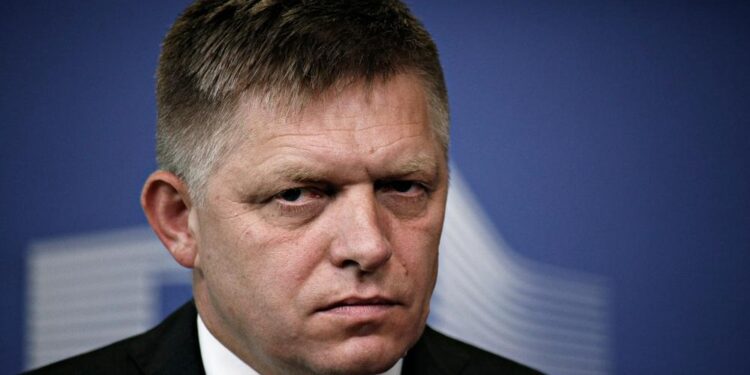Slovakia’s Prime Minister has officially ruled out the country’s involvement in the European Union’s military aid initiative for Ukraine, signaling a cautious stance amid ongoing regional tensions. The announcement, reported by Anadolu AjansńĪ, underscores the complex dynamics within the EU as member states navigate differing approaches to support Ukraine amid its conflict with Russia. This development adds a new dimension to the bloc’s collective response and raises questions about the cohesion of EU defense policies moving forward.
Slovak Premier Emphasizes Sovereignty in Rejecting EU Military Aid for Ukraine
Slovakia’s Prime Minister has firmly stated that the country will not participate in the European Union’s military assistance program aimed at supporting Ukraine amidst ongoing regional tensions. Emphasizing the principle of national sovereignty, the premier highlighted that any military aid decisions must align with Slovakia’s own strategic interests and security assessments rather than external pressures. This stance reflects a cautious approach amid calls from Brussels and several EU member states to enhance collective defense measures in response to the conflict.
The decision has sparked mixed reactions within the EU, with some member countries urging solidarity while others respect the individual sovereignty of nations. The Slovak government underscored key reasons for its position:
- Preservation of national autonomy in foreign policy and defense commitments
- Concerns over escalation risks if Slovakia becomes directly involved
- Focus on diplomatic and humanitarian assistance rather than military engagement
| Factor | Slovakia’s Position |
|---|---|
| Military Intervention | Declined |
| Humanitarian Aid | Supported |
| EU Solidarity | Conditional |
| Security Concerns | High Priority |
Implications of Slovakia’s Decision on EU Unity and Regional Security Dynamics
Slovakia’s firm refusal to engage in the EU’s military aid initiative for Ukraine underscores deep fissures within the bloc’s collective security approach. This decision not only highlights divergent national interests but also challenges the EU’s ability to present a united front against ongoing geopolitical threats. While some member states emphasize solidarity and a robust defensive posture, Slovakia’s stance signals caution rooted in historical sensitivities and concerns over escalating regional tensions.
Such a stance carries significant repercussions for regional security architecture in Central Europe. It complicates strategic coordination among neighboring countries and raises questions about the uniformity of EU-led mechanisms intended to deter external aggression. Below is a concise overview of key security considerations stemming from this development:
- Political Fragmentation: Divergent policies may hinder swift collective decision-making.
- Security Gaps: Potential vulnerabilities in defense postures along Eastern EU borders.
- Impact on Deterrence: Reduced military cohesion could embolden adversarial actors.
- Diplomatic Strains: Risk of friction between pro-aid and neutral member states.
| Aspect | Potential Impact |
|---|---|
| EU Military Unity | Weakened cohesion in defense policy implementation |
| Regional Stability | Increased uncertainty amidst regional power dynamics |
| Neighboring Alliances | Shifts in bilateral cooperation strategies |
| Risk of Escalation | Higher potential for miscalculations in conflict zones |
Policy Recommendations for Balancing National Interests with Collective European Support
In navigating the complexities of EU solidarity and national sovereignty, policymakers must emphasize transparent dialogue to reconcile domestic priorities with collective European objectives. Slovakia’s decision to abstain from participating in EU military aid for Ukraine highlights the necessity for flexible frameworks that respect member states’ individual risk assessments and public sentiment. Emphasizing mutual understanding and equitable burden-sharing can foster a more resilient Union, where commitments align not only with shared values but also with pragmatic national interests.
Key strategies to achieve this balance include:
- Enhanced diplomatic engagement: Regular consultations between EU institutions and national governments to clarify expectations and constraints.
- Tailored contribution models: Allowing diverse forms of support beyond military aid, such as humanitarian assistance or economic backing.
- Public outreach campaigns: Building domestic awareness about collective security benefits and the impact of joint action.
| Policy Aspect | Proposed Action |
|---|---|
| National Security Concerns | Regular risk assessments informing EU commitments |
| EU Solidarity | Flexible contribution options across member states |
| Public Support | Targeted campaigns to improve awareness and backing |
Final Thoughts
As Slovakia firmly rules out participation in the EU’s military aid to Ukraine, the decision underscores the complex and varied responses within the European Union regarding support for the conflict. This development adds another layer to the ongoing debate over collective European defense initiatives amid geopolitical tensions in the region. Observers will be watching closely to see how this stance influences both Slovakia’s role within the EU and the broader strategy towards Ukraine in the months ahead.
















